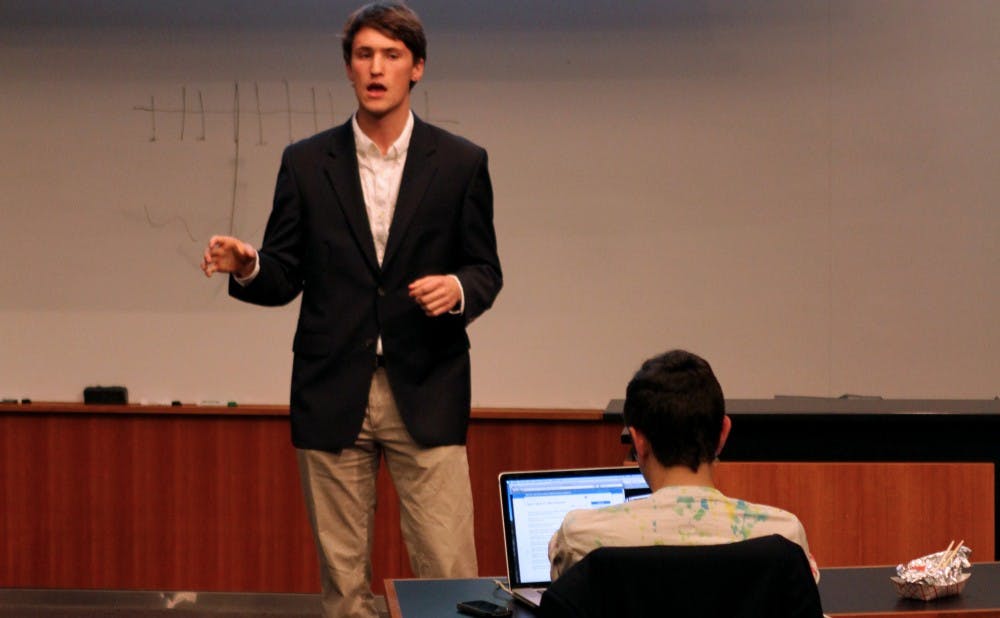Duke football cornerback Ross Cockrell, a redshirt senior, spoke about the importance of student support at games at the Duke Student Government senate meeting Wednesday evening.
In anticipation of Saturday’s game against North Carolina State University, Cockrell thanked senators for promoting student attendance at the games, noting the positive impact of student enthusiasm. He noted that support from DSG is greatly appreciated by the team.
“It is great when students are there to support us, you can hear it, you can feel it,” Cockrell said. “We really appreciate student support.”
The meeting also featured a presentation of suggestions for connecting Duke academics to local issues by sophomore Mousa Alshanteer, senator for Durham and regional affairs, and freshman James Ferencsik, senator for academic affairs.
Alshanteer, editorial page managing editor for The Chronicle, and Ferencsik called for increased options for students to learn about state and local history and policy.
“Over the past few months, a lot of bills have been passed that really impact our everyday lives,” Alshanteer said, noting that many students are not always aware of how they are affected by the changing laws.
He highlighted House Bill 589, which created numerous controversial voting requirements that affect college students, and House Bill 937, which allows concealed handgun permit holders to lock handguns in cars parked on college campuses.
The two senators collected data from peer institutions—including Stanford University, Columbia University, University of Chicago, Harvard University and the University of North Carolina at Chapel Hill—that offer courses that focus on state and local issues.
The courses would not be limited to students in the Trinity College of Arts and Sciences, Ferencsik said. He noted an engineering course at Princeton University that allows students to find and implement solutions to common problems in the community.
“There are various instances when students not only learn from their communities, but they contribute to it as well,” Alshanteer said.
Although the University offers courses on local and state politics, Alshanteer noted that these are not thorough and consistent.
Many professors have already expressed interest in teaching courses on the local community and government, Ferencsik said.
Alshanteer said gaining student support is crucial to demonstrating the need for such courses to the administration. After more specifics have been solidified, he noted that he plans to bring these suggestions to the Academic Council.
“We do not want this to be a semester-long or year-long thing,” Ferencsik said. “We want this to really last a long time.”
To express their support, students can sign an electronic petition.
In addition, the senators’ proposal called for more internships in the local government, a possible major or minor concentration in local issues and an increased number of invitations for state and local leaders to speak on campus.
“The main goal of this is to bridge the gaps between Duke, Durham and the local community,” Alshanteer said.
He noted that nearly 15 percent of the Class of 2012 took jobs in North Carolina after graduating, so the state and local politics will have a lasting impact on their lives.
In other business
Executive Vice President Nikolai Doytchinov, a junior, presented a second reading of the changes to the Young Trustee by-laws.
“We are working on clarifying the language,” Doytchinov said, noting that some changes were more substantive.
The bylaw—which was approved unanimously—allows the Young Trustee Nominating Committee Selection Committee to now have a chair.
Ferencsik presented a first reading of changes to the affiliate bylaws. The senate can vote to approve the legislation after a second reading next week.
Get The Chronicle straight to your inbox
Signup for our weekly newsletter. Cancel at any time.

